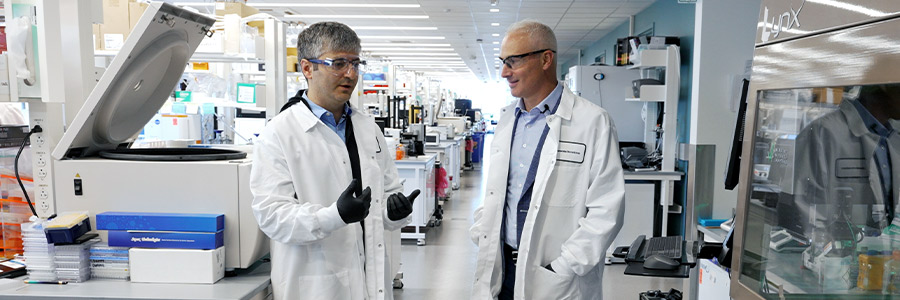The Future Is Nigh With Health Care AI: Insights From NVIDIA's Kimberly Powell
Guest: Kimberly Powell, Vice President, Healthcare, NVIDIA
Host: Joshua Buchalter, Director, TMT – Semiconductors Research Analyst, TD Cowen, and Brendan Smith, Director, Life Science & Diagnostic Tools and Biotech Analyst, TD Cowen
TD Cowen analysts Joshua Buchalter (Semiconductors) and Brendan Smith (Health Care) speak with NVIDIA's Vice President of Healthcare, Kimberly Powell, at TD Cowen's 45th Annual Health Care Conference. The conversation focuses on the significant opportunity to leverage agentic and physical AI across three health care buckets, including digital devices and imaging, drug discovery, and digital health. Health care represents one of NVIDIA's largest, and most important, future AI opportunities.
This podcast was originally recorded on March 3, 2025.
Brendan Smith:
Welcome to TD Cowen Insights, a space that brings leading thinkers together to share insights and ideas shaping the world around us. Join us as we converse with the top minds who are influencing our global sectors.
Joshua Buchalter:
Hi, I am Josh Buchalter, semiconductor analyst at TD Cowen. Really pleased to be at our 45th Annual Healthcare Conference today with Brendan Smith, who covers life science tools, diagnostics, and biotechnology. And more importantly, Kimberly Powell, VP of Healthcare at NVIDIA. Kimberly, thank you for joining us.
Kimberly Powell:
Thanks for having me, Josh.
Joshua Buchalter:
I guess to start the discussion, you work at a tech company, I'm a semis analyst. What are we doing here? And from a high level, how does NVIDIA support the healthcare market in particular across the three verticals you've described as digital surgery, digital biology, and digital health?
Kimberly Powell:
Yeah. Well, it's been a wild journey. NVIDIA's been working on what's called accelerated computing for over two decades. We build computers to solve problems that normal computers cannot. In fact, when we were first inventing accelerated computing, the very first applications were in healthcare. It started in medical imaging and doing what's called image reconstruction of CT so you could lower the dosage, make it more safe for children, or it was for molecular dynamics so you could understand how drugs and biology interact. And so some of these were the earliest applications of our platform.
And we're here today, fast-forward 20 years, one of the breakthroughs that accelerated computing, of course enabled, is artificial intelligence. And artificial intelligence is domain specific. If you really want to take advantage of it has to be customized, if you will. It has to be built for that domain. And so we believe, and I think a lot of people believe that healthcare is going to be one of the most important industries for artificial intelligence. And so our job is how do we make it more accessible as a computing platform company? And we're rooted in three really important verticals that drive a lot about what happens in healthcare. It still exists that imaging and surgical robotics are the very first part of your patient journey.
When you don't feel good, the first thing you're generally getting, some kind of imagery. How do you make sure that we can understand everything and see everything that's going on in that imagery? And then when you're going to get a therapy, how can we make those more precise and have better outcome for patients? And so we work with a whole ecosystem of GE Healthcare and Siemens and the robotic surgery industry to allow them to take advantage of this. We call that digital devices, really helping take what are these amazing sensor technologies that let us see inside the body or allow us to have steady movement inside the body, but now overlay a whole bunch of artificial intelligence on top of them.
Another really exciting industry is in the area we call digital biology. Also could be called drug discovery. $300 billion is spent in drug discovery and R&D every single year. But we still face some huge challenges there where there's about a 90% failure rate when we go into clinic with drugs. So we really need to take advantage of artificial intelligence technologies to really generate new ideas in healthcare. And so we've created a platform called BioNeMo that is exactly taking advantage of the techniques for large language models that we use in language, but making it domain specific and be able to be applied to biology and drug discovery.
So think about it, large language models like ChatGPT, and these foundation models are built on a sequence. They're sequence models about human language. Well, biology is actually a sequence, right? Your genome is 3 billion character long sequence. So we can use models and we have to use these AI models to really extract the understanding out of biology because it's really not meant for a human to be able to understand. So huge revolution going on there in terms of AI and drug discovery.
And then the third area that super excited about, and you're hearing a lot about is in the area of digital health. For a while, last two decades, we've been digitizing healthcare information in our electronic health records and otherwise, but it's still oftentimes not quite as accessible or efficient. Today, the world's spending $10 trillion on healthcare, and over 30% of that is in labor. It's in the labs, it's in the infrastructure. And so if we need to meet the continuously growing demand of healthcare services with what is unfortunately a low supply and a burnt out supply of healthcare professionals, AI has to be the answer. And so with Agentic AI and everything that has been able to be built, we're really going to see that be as digital healthcare services for hire to augment patient journeys, patient engagement, augment nurses being able to do things, or clinicians having to do any kind of administrative work. We're going to be able to take care of that with agents. So those are the three areas that I'm just super excited about.
Joshua Buchalter:
Yeah and maybe I wanted to just double click a little bit on the drug discovery side of that conversation. At this point, lay of the land, where do you see areas that are potentially the most misunderstood or underappreciated in terms of how AI is being applied and driving advancements today?
Kimberly Powell:
Yeah, drug discovery is a science, they call it discovery because it requires a lot of experimentation. It requires a lot of deep scientific understanding. I think that the industry is just starting to realize and appreciate that all of that incredible lab work, experimental work that they're doing, that data that they generate, that scientific thinking can actually be brought into AI models. And they can codify all of the data that they generate. That is their IP, essentially. They can codify their IP, they can codify their scientific process now into these AI models. And there's a new term in the industry that's being called lab in the loop, where we can now use AI and generative AI methods to generate new chemical entities that maybe humans would've never thought of.
There's 10 to the 60 potential chemicals out there that could be a therapy. There's 10 to the 120 or something potential proteins that could be a therapy. So what if you can generate things that we've never seen before, nature's never made before, but then you can use AI methods to not only generate the idea, but predict it for the appropriate features and characteristics that you need? You don't want it to be toxic or anything like that. And then you can optimize it for its synthesis ability, its makeability. Then you can go into the lab. And so this idea of lab in the loop and codifying it all and doing sort of this in this quick turn inner circle, we're really seeing what's called a huge boost in R&D productivity. And so I think that we're going to continue to have the industry recognize that their amazing laboratory and scientific prowess can really be brought to a whole new level of understanding and reusability when they can represent it in a computer in these new AI methods.
Joshua Buchalter:
Yeah. So I guess looking forward now, I mean, what do you think it's going to take to really get even some of the biggest skeptics of AI on board with this? What do you really foresee as a potential watershed moment here? Is it the first AI driven developed approval of a drug that was developed this way? What does this look like now moving forward?
Kimberly Powell:
Yeah, I do think that's going to be incredibly helpful. We have a lot of great companies, Insilico Medicine, Recursion, others that are in later clinical stages of AI discovered drugs. And they sort of chronicled their whole journey and you're seeing R&D processes that used to take three to five years are being shrunken into months. They can count it in months now. 18 months, sometimes 10 months to get into clinic. And so I do believe that when one of those drugs comes out the other side with the FDA approval, it is going to be a watershed moment.
I like to think of it as a Tesla motors moment in the automotive industry and having that sort of feeling like lab in the loop is the only way forward to be able to, when we generate this data, build it into a brain that allows us to move really, really fast and build better drugs with the characteristics that we need that are more targeted to the biology. And so I do think that's going to be a watershed moment. And investors are sometimes looking for that silver bullet, but R&D productivity I think is just truly underappreciated. You're being able to really churn through ideas on a timescale. It's like, remember when... Well, you wouldn't remember this, or neither do I, but the fact that you can get from Boston to San Francisco in six hours changes your whole behavior. That same phenomenon is going to happen now in R&D when you can get from idea to something proven out in the lab codified in a model into the clinic. That's going to be truly transformational.
Joshua Buchalter:
Stepping back, NVIDIA has been a key enabler and disruptor in multiple industries. What are you most excited about in the next 5, 10 years as we think about a healthcare industry that's accelerated by AI?
Kimberly Powell:
Yeah, I'm really excited about this. One thing I'm really excited about immediately, very near term is these, what I call digital health agents. We work with some phenomenal companies. Abridge is a company that made an application that does clinical documentation. So instead of your doctor having to stare at a computer while you're having a conversation, it is transcribing that whole conversation. It is summarizing it perfectly for the physician. It can go right into the electronic health record, giving that physician two hours of his time or her time back every single day. And yet it had a complete transformation of the patient experience. And so I'm already experiencing this in my doctor's office. That's when you know it's changing, is when you as a patient are starting to feel some of these technologies.
So I think this year of 2025 is going to be a breakout year of the digital health agents, facilitating new patient experiences, facilitating a lot of burnout, that the administrative burden of our healthcare system imparts on our amazing lifesaving healthcare services teams. So I think that's very near future. And then I think midterm, two things are happening. We just talked about AI and lab in the loop for drug discovery, and we need it because not only do we need more medicines, we're continuing to make even more and more therapeutic platforms, cell and gene therapy. There are so many more potential ways of delivering and getting medicine into humans that we need to be generating a lot more ideas. I think this lab in the loop is going to really amp up, if you will, shots on goals since we were talking about a little hockey, but also improve what's going into the clinic immensely.
And then the other area that I'm really, really excited about is we're going to see a healthcare robotics revolution happen. One of the things NVIDIA is working really hard on is we're in the age of Agentic AI, and the next wave of AI is what's called Physical AI. And this is AI that doesn't just understand the digital world, it understands the physical world. And if you think about healthcare, it's a very physical industry. The hospital is a physical place. The medical device or the surgical robotics is a digital instrument. Even us as human, I mean, we are physical. We're governed by the laws of physics. And so you're going to see a whole bunch of new healthcare robotic solutions where the whole hospital is going to be a robot. In the future, not too distant future, you're going to have service delivery robots. How can we offload a nurse who could be caring for a patient, not have to deliver sheets or deliver a meal, but that could be on a service delivery robot, or how can you have other assistive robots in the hospital?
You're going to have many different kinds of robots that need to be deployed in a hospital. So it itself needs to have a digital twin. It needs to be able to test and validate these robots that are being deployed. Similarly now, the very important area, as humanity benefited from minimally invasive surgery, which has been pioneered with companies like Intuitive Surgical, how can we extend that reach by bringing more AI to these surgical platforms so that countries that otherwise didn't have the specialist trained surgeon can be guided by AI? You can only teach in AI for surgery in a virtual environment. You could just never perform enough surgeries to use that training data to train it. So we've got to create this virtual platform that understand, obeys the laws of physics, understands the very domain specific physical environment of humans and the hospital environment. And so I'm very excited about the next couple of years in a healthcare robotics revolution, and I do hope I see robots running around next time I have to have a procedure done.
Joshua Buchalter:
Well, Kimberly, we at TD Cowen are excited for the world of healthcare that you're describing, and we're rooting for your success. It's important what you guys are working on. So thank you and thank you for joining us.
Kimberly Powell:
Thank you so much for the opportunity. Appreciate it.
Brendan Smith:
Thanks for joining us. Stay tuned for the next episode of TD Cowen Insights.
This podcast should not be copied, distributed, published or reproduced, in whole or in part. The information contained in this recording was obtained from publicly available sources, has not been independently verified by TD Securities, may not be current, and TD Securities has no obligation to provide any updates or changes. All price references and market forecasts are as of the date of recording. The views and opinions expressed in this podcast are not necessarily those of TD Securities and may differ from the views and opinions of other departments or divisions of TD Securities and its affiliates. TD Securities is not providing any financial, economic, legal, accounting, or tax advice or recommendations in this podcast. The information contained in this podcast does not constitute investment advice or an offer to buy or sell securities or any other product and should not be relied upon to evaluate any potential transaction. Neither TD Securities nor any of its affiliates makes any representation or warranty, express or implied, as to the accuracy or completeness of the statements or any information contained in this podcast and any liability therefore (including in respect of direct, indirect or consequential loss or damage) is expressly disclaimed.


Joshua Buchalter, CFA
Director, TMT – Semiconductors Research Analyst, TD Cowen

Joshua Buchalter, CFA
Director, TMT – Semiconductors Research Analyst, TD Cowen
Joshua Buchalter is a director covering the semiconductor and mobility technology sectors. He has been working on the semiconductors team at TD Cowen since 2018.
Prior to joining TD Cowen, Mr. Buchalter covered the semiconductor sector as an equity research associate at Oppenheimer & Co and Needham & Co.
Mr. Buchalter received a BSc in economics from Tufts University, an MBA in finance and accounting from Boston College, and is a CFA® charterholder.


Brendan Smith
Director, Life Science & Diagnostic Tools and Biotech Analyst, TD Cowen

Brendan Smith
Director, Life Science & Diagnostic Tools and Biotech Analyst, TD Cowen
Brendan Smith joined TD Cowen in 2019 and covers life science & diagnostic tools and biotech. He holds an MA, MPhil, and Ph.D. from Columbia.






